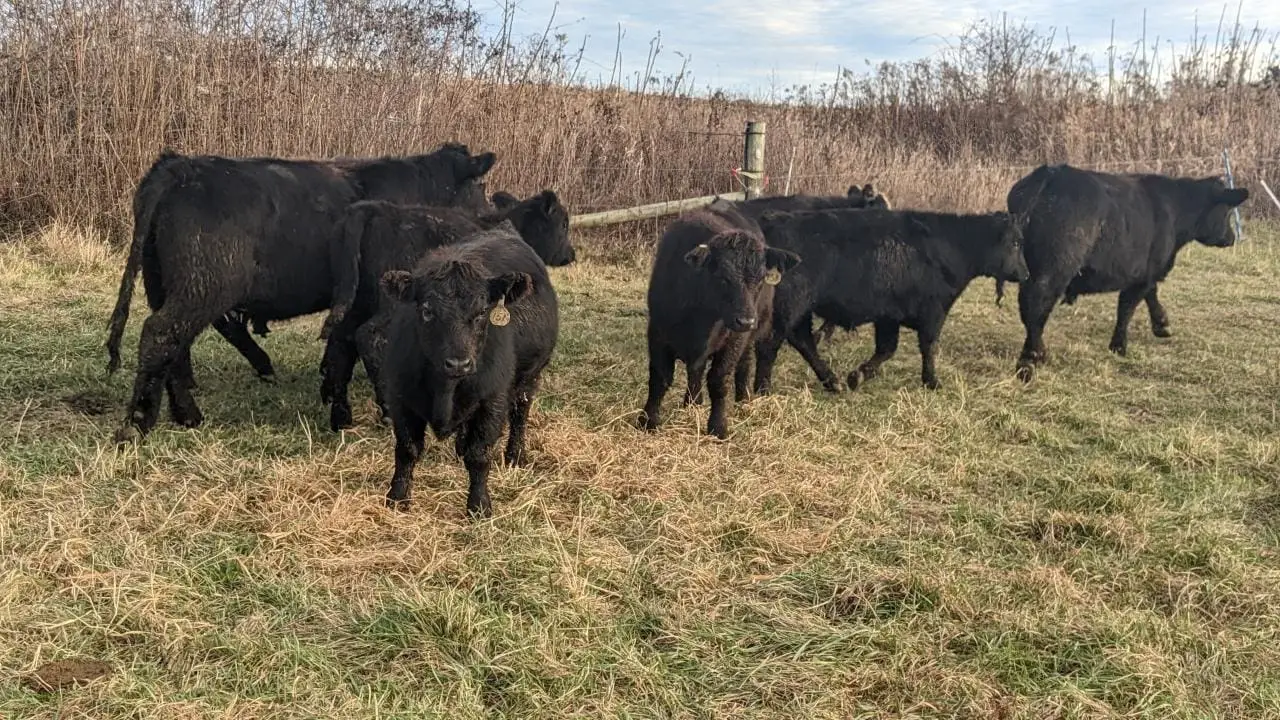This was calf week on the farm. On Saturday our neighbor Mike brought twenty-four newly weaned calves across to our side of the fenceline. And then on Friday, Josh, another cattle farmer in the area, brought six more calves and a couple of yearlings. Within a few days, the herd more than doubled in size, and suddenly we’re swarming with cattle again. It’s rowdy and joyful and messy and wonderful. These calves will stay on our pastures for the next year and a half, as they grow into their full grass fed glory.

Every fall, when the calves come charging and bucking through the gateway, I’m grateful for the partnerships we’ve forged with other farmers. We’ve come a long way together. I appreciate the power of togetherness so much more than when I started farming.
Early on we tried being an “everything” farm. We had cows and a bull, and all our calves were born on the farm. We raised meat chickens, egg layers, turkeys, and ducks. We had boars and sows and piglets, and a separate herd of grower pigs. We even kept sheep and horses for a while. It was occasionally wonderful. But mostly it was stupid. We were too spread out, scattered across too many urgent needs, unable to give anything the attention it deserved. And we had too little land or capital for all of our ambitions. As chaos rained down on us, we realized that doing everything wasn’t appropriate, specifically, that we weren’t faming appropriately to who we were.
I don’t know if we could have learned those lessons without having gone too far in the wrong direction first. Harsh reality was an effective teacher. I remember how sad Rachel and I were when we discussed how we needed to stop raising our own calves and piglets on the farm. It felt like a dream was dying. We carried a feeling of loss, of grief, for a while. At the time we couldn’t see that something better was possible; it simply seemed like a turn for the worse.
All these years later, we wonder back at our past selves. And we see ourselves with some compassion, understanding only now that back then, we were holding on to impossible plans for too long because we couldn’t imagine a better alternative. It is fascinating to see the progression of our love for our farm and our farming, as time and experience have reshaped the way we value the balance between independence and interdependence. We couldn’t have imagined at the time that we’d be more settled and satisfied.
Today, we still accomplish a huge amount right on our land. But we live in a network of partners in farming. Two different farming families supply the calves we raise. Two brothers and their families provide the pigs and sheep we sell. We have another great little farm stocking us with grass fed butter. And two tireless guys across town who process our poultry. None of this is coordinated as a formal group, but the connections are real and meaningful. We enjoy meals together. We stop to chat, leaning on a truck or a tractor tire. We borrow tools and equipment. We complain about the weather and share tips about where to get a good deal on fence wire. We have come to feel some value toward each other because we each rely on the other. We’ve slowly aggregated a set of strong connections to people as we’ve learned to realize that as small farmers, our strength is in our togetherness.
As I now understand small-scale farming, I believe our original problem was in thinking that we could overcorrect as a response to the problems of industrial agriculture. We didn’t want to be part of monoculture farming, the insanely narrowly-focused model behind most of the world’s food production. So we shot off along the opposite trajectory toward super-diversification. But that extreme only led to its own grief. It took us a long time to realize that we couldn’t fix a problem by doing the opposite thing. We had to do something different. That seems to be the pattern of so many conundrums we face, where polarizing topics call for us to choose either left or right. It is hard to imagine that we might have other options besides left and right. There’s up and down, forward and reverse, pitch, yawl, and roll.
As always, I’m surprised at the inadvertent prescience in naming our farm “Wrong Direction Farm”.
